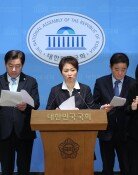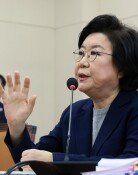Report: Welfare Expenditures To Double by 2030
Report: Welfare Expenditures To Double by 2030
Posted April. 21, 2005 23:17,
According to a report, by 2030, the welfare budget for government expenditures will be double of the current one, and the budget for economic sectors like SOC investment will be reduced to half.
Welfare expenditures, which are provided to certain classes in the form of lump sum payments, such as transportation benefits for the elderly and subsidies for vehicles for the disabled, would be changed so that different amount of benefits are given depending on the recipients income levels and the standard of living of the public.
The minister of Planning and Budget, Byeon Yang-kyoon submitted a report titled, 2005 Major Plans with the above information on April 21 to President Roh. The ministry plans to upgrade the government resource distribution system into one that is similar to what can be found in advanced countries so that a larger share is allocated for the welfare sector. It is hoped that this will ease the burden for the public by reducing expenditures in the economic sector.
Current expenditures for welfare take up 26.6 percent of all financial expenditures (according to the 2005 budget), but according to projections, by 2015, this could increase to 35.6 percent, and by 2030, it could rise to 46.7 percent. In contrast, expenditures for the economic sector would be reduced from the current 19.7 percent to 10.6 percent by 2030.
The ministry also plans to thoroughly review whether it is necessary to maintain various payments, which are more like quasi-taxes, all from the start. By the latter half of this year, it hopes to come up with restructuring measures.
Moreover, in order to boost the transparency of corporate structures of public entities, the ministry is proposing a standard for corporate structure, specifying the structure of boards, CEO appointment procedures, and other measures by this September. The ministry said, This is to possibly prevent external pressures from related ministries toward public entities, explaining, There is a chance that problems related to high-handed personnel administration could be eliminated.
Chi-Young Shin higgledy@donga.com






![하버드 의사가 실천하는 ‘뇌 노화 늦추는 6가지 습관’ [노화설계]](https://dimg.donga.com/c/138/175/90/1/wps/NEWS/IMAGE/2026/01/22/133210626.3.jpg)
